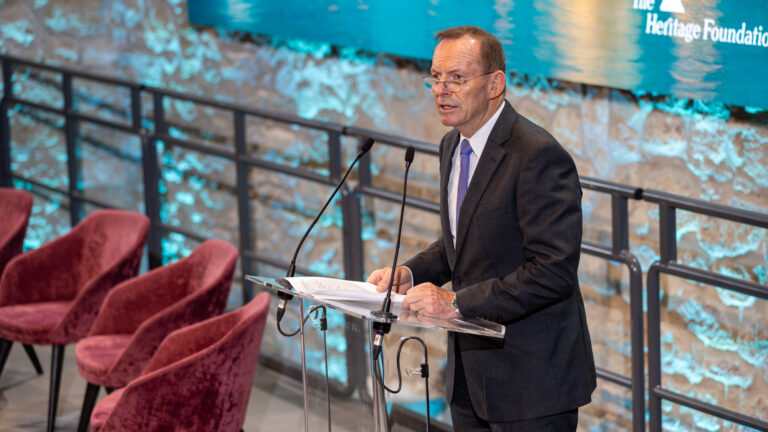Nikola Kedhi is the Chairman of the Board of Directors at the Albanian Policy Center. He recently attended the conference Rule of Law as Lawfare, co-organized by the Danube Institute, the Center for Fundamental Rights, and The European Conservative in Budapest. On the sidelines of the conference, he sat down with Hungarian Conservative to discuss how the rule of law is a threat to constitutional sovereignty, how Brussels-imposed judicial reform has failed in Albania, and what future he sees for the European Union.
***
As has been mentioned several times during the conference, the rule of law procedure can be viewed as a threat to constitutional sovereignty. But why and how is it a threat?
First, we have to note that there are transnational rules, that come from beyond a certain country. They have these characteristics that not very well defined. Also, they come in arbitrary form by people who are not elected, who are not accountable. On the other side, constitutional sovereignty is very well defined. It has a written form, it is based on certain traditions that a country has and by definition, they are sovereign. They are either implemented or appalled by people who are accountable to the electorate in general. So these two are complete opposition to one another. Therefore, transnational rules will always threaten constitutional sovereignty because decisions are taken by people who not necessarily have the best interest of the people of a certain country. This is an issue in Europe, within the European Union, but of course also in the United States and many Western countries, where there is a desire to impose rules beyond the borders or constitutional framework of a country.
How can a nation state protect itself against such attacks on its sovereignty?
This is a serious issue today everywhere, and it’s difficult, because it’s not a matter of simply electoral outcomes. Nowadays, we have systems of democracy that are distorted. The media has become a political actor, certain institutions, universities that have become politicized. So the battle of ideas needs to be waged in all of these arenas, and constantly, not just when the elections come. Unless it would be impossible to defeat this impositions that comes from upper levels, from the bureaucracy, from people that are unaccountable.
It needs to be a constant battle.
In media, in academia, in the political field as well.
As an EU candidate country, Albania has to meet certain criteria, which means that the EU tells them what to do in order to become a full member state. What has been the average experience with the reforms supported ny and implemented with the help of Brussels?
Albania is a post-communist country that suffered for 45 years under a system where one man or one party held all the power. During the 30 years of transition, it has faced numerous issues such as corruption, instability, and inconsistent rule of law, which has not always protected individuals. Consequently, the faith that Albanians have in their institutions is very low, not only because of the legacy of communism but also due to the chaos that has persisted over the past 30 years.
However, there was considerable progress done in the years 2005, 2009 especially, up to 2013. And there was an upward trajectory for Albania. It joined NATO. It did the necessary reforms to join the European Union, to get the candidate status, which it got in 2014. There was a considerable economic growth, even despite the crisis of 2008.
But in the past years, there has been a huge setback, which is largely due to the transnational rules that come from outside the country. Albanians, precisely because of this low faith in their institutions, trust the European Union and the United States. But what happens when the EU and the US make decisions that go against or harm Albanian national interests? A clear example is the judicial reform in Albania, which was carried out with the help of Brussels and Washington using taxpayers’ money. Hungarian people have also paid for this reform.

As we know now, the reform has failed, but European and US bureaucrats claim it’s working. Due to the changes, many judges who deserved to remain in the system have had to leave because they were selectively removed. Many new judges have entered the system who are close to the government or have ties to the previous communist regime. By law, they should not hold these positions because they served as prosecutors or investigators during the communist era. As a result, we now have a judiciary, from prosecutors to judges, who are often afraid to act as they should in many corruption cases due to government influence.
Moreover, the leader of the opposition, Sali Berisha has been under investigation for almost four years without finding any proof against him in all this period. He is being held under house arrest since December 2023 without any formal accusation. This is a serious violation of the Constitution and human rights.
If they can do this to the leader of the opposition, imagine what could happen to an ordinary citizen.
The European Union, the United States, and the international community turn a blind eye and continue to claim that reforms are working. Now I ask: what should European taxpayers, who have funded this reform, think? Bureaucrats have wasted their money to impose something from outside a country that harms the interests of ordinary citizens.
And these bureaucrats are overwhelmingly leftists. Could this change after the European elections?
I hope the shift to the right occurs because I believe it will bring more accountability to the institutions. In recent years, the bureaucrats who have ruled Brussels have imposed their will on EU institutions and legislation, which is not shared by many European citizens. That’s why I think this rightward shift is important. It will also help put a stop to many economic decisions that ultimately harm European citizens.
In recent years, both in the EU and the US, the radical left has created a significant gap between ordinary citizens and the elites, which continues to widen. To narrow this gap, Europe needs to shift politically towards the conservative side. I believe this is achievable, but the right must be united. In my opinion, what unites the right is stronger and more important than what divides it. It is also crucial for the European People’s Party (EPP) to return to its conservative roots, which it has abandoned in recent years. The right’s success largely depends on the EPP, as it is expected to be the largest group.
How could this affect the Balkan enlargement process? For example, Hungary has always supported the acceleration of the procedure.
Look, I understand the scepticism many conservatives have about enlargement, but these countries are undeniably European. Albania is part of Europe; it has a 2000-year history of engagement with other European countries, and its identity is European. I believe all Albanians want their country to join the EU as an equal state and as a nation that has something to contribute. For this to become a reality, we need the support of European countries, especially conservative member states. We must stop the interferences that harm Albanian democracy, institutions, and citizens. Together, we need to create synergies to enable Albania to join the EU as an equal, upholding the same standards as other member states.
Related articles:







